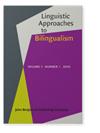语言迁移生态中的双语动态
IF 1.8
2区 文学
0 LANGUAGE & LINGUISTICS
引用次数: 19
摘要
世界上很大一部分语言——从50%到90%不等——目前处于我们所说的转移生态中,即不稳定的双语或多语的情况下,使用者,特别是年轻人,不再使用他们的祖先语言,而是使用多数人使用的语言。本论文解决了几个相互关联的问题,关于这种转移生态中双语的语言影响。这些语言生态是动态的:语言选择和偏好会变化,使用者的熟练程度也会变化。其中一个结果是这些濒危语言社区出现了多种变体。理解变化和转变需要一种建立基线的方法;描述性语法很少提供关于用法和多语言语言实践的信息。另一个混杂因素是一系列的语言变异:地域(方言);代际(语言-内部变化,没有接触或转移);以接触为基础(有或没有轮班接触);以及基于熟练程度的(由于输入和使用水平的不同而产生的差异)。今天,广泛的、持续的语言转换提供了机会来研究由转换的说话者所表现出的语言变化,也就是说,把语言的变化和损失归零在过程中,而不是作为最终产品。本文章由计算机程序翻译,如有差异,请以英文原文为准。
The dynamics of bilingualism in language shift ecologies
A large percentage of the world’s languages – anywhere from 50 to 90% – are currently spoken in what we call shift
ecologies, situations of unstable bi- or multilingualism where speakers, and in particular younger speakers, do not use their
ancestral language but rather speak the majority language. The present paper addresses several interrelated questions with regard
to the linguistic effects of bilingualism in such shift ecologies. These language ecologies are dynamic: language choices and
preferences change, as do speakers’ proficiency levels. One result is multiple kinds of variation in these endangered language
communities. Understanding change and shift requires a methodology for establishing a baseline; descriptive grammars rarely
provide information about usage and multilingual language practices. An additional confounder is a range of linguistic variation:
regional (dialectal); generational (language-internal change without contact or shift);
contact-based (contact with or without shift); and proficiency-based (variation which
develops as a result of differing levels of input and usage). Widespread, ongoing language shift today provides opportunities to
examine the linguistic changes exhibited by shifting speakers, that is, to zero in on language change and loss in process, rather
than as an end product.
求助全文
通过发布文献求助,成功后即可免费获取论文全文。
去求助
来源期刊

Linguistic Approaches To Bilingualism
Social Sciences-Linguistics and Language
CiteScore
3.20
自引率
9.10%
发文量
24
期刊介绍:
LAB provides an outlet for cutting-edge, contemporary studies on bilingualism. LAB assumes a broad definition of bilingualism, including: adult L2 acquisition, simultaneous child bilingualism, child L2 acquisition, adult heritage speaker competence, L1 attrition in L2/Ln environments, and adult L3/Ln acquisition. LAB solicits high quality articles of original research assuming any cognitive science approach to understanding the mental representation of bilingual language competence and performance, including cognitive linguistics, emergentism/connectionism, generative theories, psycholinguistic and processing accounts, and covering typical and atypical populations.
 求助内容:
求助内容: 应助结果提醒方式:
应助结果提醒方式:


